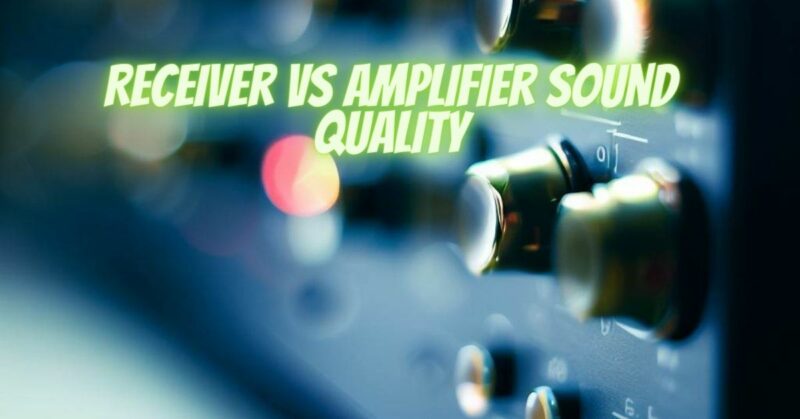When it comes to building an audio system, choosing the right components is crucial for achieving the desired sound quality. Two key components that often spark a debate among audio enthusiasts are receivers and amplifiers. While both play essential roles in powering speakers, they differ in functionality and features. In this article, we’ll explore the differences between receivers and amplifiers in terms of sound quality, helping you understand how each component can impact your audio experience.
Understanding Receivers:
A receiver is an all-in-one unit that combines a preamplifier, power amplifier, and various audio inputs. It typically includes features like radio tuners, built-in streaming capabilities, and audio processing options. Receivers are designed to provide convenience and versatility, making them suitable for home theater setups and multi-channel audio systems.
Sound Quality of Receivers:
Receivers vary in sound quality based on factors such as build quality, internal components, and signal processing capabilities. While some high-end receivers can deliver impressive sound performance, receivers tend to focus on versatility and functionality rather than pure audio performance. This is because receivers allocate resources to accommodate features like multi-channel audio processing, digital signal processing, and built-in amplification, which may result in a compromise in audio quality compared to dedicated amplifiers.
Understanding Amplifiers:
Amplifiers, also known as power amps or integrated amps, are dedicated components designed to amplify audio signals from preamplifiers and drive speakers. Amplifiers come in various configurations, including stereo (2-channel) or mono (single-channel) designs, and they focus on delivering pure, high-quality audio amplification without additional features found in receivers.
Sound Quality of Amplifiers:
Amplifiers are specifically engineered to provide robust amplification, resulting in potentially better sound quality compared to receivers. Since amplifiers are dedicated to amplifying audio signals, manufacturers can focus on optimizing the circuitry, using high-quality components, and minimizing interference or distortion. As a result, amplifiers can offer greater clarity, detail, and dynamic range, providing a more transparent and faithful reproduction of the audio source.
Choosing the Right Component for Sound Quality:
When it comes to sound quality, the choice between a receiver and an amplifier depends on your specific needs and priorities:
- Versatility vs. Audio Performance: If you value versatility, convenience, and features like multi-channel audio and streaming capabilities, a receiver is a suitable choice. However, if achieving the best possible sound quality is your primary goal, a dedicated amplifier may offer a more refined and audiophile-grade performance.
- System Configuration: Consider the type of audio system you intend to build. If you’re constructing a home theater setup or a multi-channel audio system, a receiver provides the necessary features and power for such configurations. On the other hand, if you’re building a stereo-focused audio system and prioritizing sound quality, an amplifier may be the better choice.
- Budget Considerations: Dedicated amplifiers, particularly high-end models, can be more expensive than receivers due to their specialized design and focus on audio performance. Consider your budget and allocate funds accordingly to strike a balance between sound quality and functionality.
| Feature | Receiver | Amplifier |
|---|---|---|
| Channels | Typically 5.1 or 7.1 | Typically 2.0 or 2.1 |
| Features | Tuner, remote control, video processing, surround sound decoding | None or fewer features |
| Sound Quality | Good | Better |
| Price | Typically more expensive | Typically less expensive |
Conclusion:
Choosing between a receiver and an amplifier involves weighing your priorities for sound quality, functionality, and budget. Receivers offer convenience and versatility, while amplifiers focus on delivering purer audio amplification. Consider the nature of your audio system, desired sound quality, and specific features required to make an informed decision. Ultimately, both receivers and amplifiers have their place in audio setups, and selecting the right component depends on your unique preferences and requirements.


